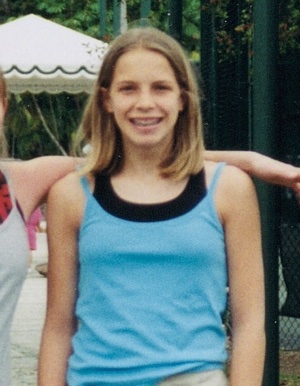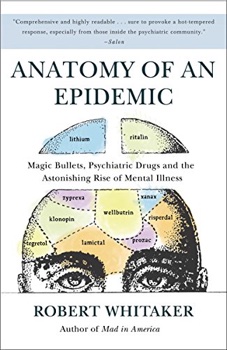An Introduction and Warm Welcome

Setting the Stage
My name is Laura Delano and I’m the co-founder and Executive Director of Inner Compass Initiative and ICI’s Inner Compass Initiative. In this inaugural blog post, I’d like to introduce you to our organization by sharing a bit of my story with you, because my personal experiences with the mental health system are what led me to the vision for ICI, and into working with others over the past two years to bring this vision to life.

I am an ex-psychiatric patient. I spent fourteen of my most formative teenaged and twenty-something years acquiring a long list of psychiatric diagnoses including Bipolar disorder, Major depressive disorder, Substance use disorder, Binge eating disorder, and Borderline personality disorder. I took at least nineteen different psychiatric drugs, and was typically on three to five drugs at a time. I was hospitalized four times, and attended countless partial hospital programs, outpatient day programs, therapy groups, and individual therapies. In a nutshell, if there was a prize awarded to the patient who best complied with doctor’s orders and diligently sought out nearly every kind of help there was on offer in the mental health system, I may very well have won it.
But after well over a decade of being a “compliant patient”, I found myself unable to take care of myself, maintain relationships, hold down jobs, or feel connected to myself. I thought about suicide every day. Ivy League-trained psychiatrists declared me “treatment-resistant” — in other words, they told me I was so “mentally ill” that even the best treatment out there wasn’t having an impact on my life-long, incurable biochemical brain condition. And so, after all those years of diligently doing what I was told by my doctors, I gave up hope that I might ever be able to be at peace in the world. I concluded that death was the only logical solution to my life sentence of “treatment-resistant mental illness”, and in the fall of 2008, I tried to kill myself.
Waking Up
I woke up from my coma two days later, with the painful awareness that I’d “failed” even at dying. Two years later, though, through a series of events, I began to wake up to a radically different realization: ‘Perhaps there are more options on my horizon than just treatment-resistant mental illness or suicide.’ I won’t delve here into the details of how this waking up process unfolded (it’s a long story!), but I will say that much of it was catalyzed by one big, terrifying decision: to step back from the deeply embedded, powerful stories I’d been taught over all those years about who I was (“A person with mental illness”) and what my struggles meant (I was “sick” and needed “treatment”) and instead, believe in the possibility that I might actually stand a chance at a different future. And this meant that I also had to take a leap of faith into the great expanse of unknown before me, and believe that I might be capable of truly growing, changing, and transforming who I was despite having believed for so long that it wasn’t possible.
I began to question the sources I’d previously relied on unquestioningly to make sense of my profound mental and emotional difficulties. I started to unpack and think critically about the various beliefs I’d been carrying about myself. And I sought out new sources of information to help me get better informed about psychiatric diagnoses and psychiatric drugs beyond those I’d found in doctors’ offices and clinics and hospitals and on websites like WebMD.

Eventually, this process of self-education led me to conclude that I needed to come off my medications. My psychopharmacologist told me this was a bad idea, but I listened to my instincts and instead began to seek out the support of others who’d left the mental health system before me — people who had been in my shoes, felt similar kinds of pain, and moved through it. People who’d once believed in the story that their suffering and struggle and breakdowns and breakthroughs meant they were “sick”, and no longer did. People who’d taken psychiatric drugs for many years like me and come off them.
Though I didn’t realize it at the time, I was beginning to take back my power. To reconnect with my innermost wisdom. To learn how to listen to and trust in myself once again. And to discover the beautiful sense of aliveness that comes from connecting face-to-face with fellow human beings who’ve been in the darkness you’ve been in and come through the other side.
Over the course of a year, I left behind my psychiatric diagnoses, my psychiatric drugs, and my relationship to the mental health system.
Looking Back and Looking Forward
Honestly, coming off the drugs so quickly was a nightmarish experience that I’d never wish on anyone. And I am acutely aware that the circumstances of my life afforded me access to many opportunities, gifts, and resources that facilitated my departure from psychiatric patienthood. I’m also aware that many people are born into a different set of circumstances that leave them without financial stability, reliable food and shelter, access to “free” time and safe spaces in which they cry and scream and rage and curl up into a ball for as long as they need to without fear of being incarcerated or medicated against their wills, and so much more that I’d been lucky enough to have access to. So in large part, my vision for Inner Compass Initiative arose as a response to these stark realities. As I grappled with how many resources and supports I’d needed to make my way out of the mental health system, I wondered, What would an organization look like that could help people find what they truly need once they begin seeking pathways out of, detours around, and alternatives to the mental health system?
I thought about what I’d most needed as I made my way out of the mental health system:
- Access to independent sources of information about psychiatric diagnoses, psychiatric drugs, and the mental health system more broadly, along with opportunities to connect and discuss with others about what I was learning.
- Access to reliable information about the safest known ways of tapering off psychiatric drugs.
- Access to support from people who understood what I was going through and were willing and able to be there by my side and to help in whatever ways they were able to as I made my way off psychiatric drugs.
- Access to in-person spaces free from the threat of a 911 call, forced hospitalization, or forced medication where I could connect face-to-face with others who’d been through similar experiences, share my voice, and hear the voices of others, and where we could learn from one another’s wisdom and experiences.
- Access to information about other frameworks for making sense of the difficulties that come with being human beyond “mental illness” and “mental health”, and about non-medical, non-pharmaceutical ways to navigate these experiences.
Ultimately what I needed were resources and supports that weren’t designed to “help me” so much as to provide me with what I needed to begin to reclaim my life. Though I wasn’t necessarily aware of it at the time, I see now that something deep down within me wanted to learn how to question and think critically, to figure out how to be with my pain and listen to my body, to realize the power of mutual aid, and to discover that there was great meaning in all of my struggles and darkness. My hope is that the Inner Compass Initiative website, along with ICI Connect will provide some of those kinds of resources to others.
When I close my eyes and envision the possibilities that can emerge when we connect to information, resources, and most importantly, to each other, my heart and mind are flooded with many beautiful ideas about what we can build together. I will be sharing some of those in this blog over the coming weeks and months, and I hope to hear your thoughts, feedback, ideas, dreams and plans along the way! I am honored and humbled and grateful to be afforded the chance to lead Inner Compass Initiative and want to take this moment to express my deepest heartfelt thanks to the many people who have contributed in different ways to helping me and this organization get here (link). As we launch ourselves into the world, I am eager for you to join ICI Connect and/or ICI Connect and check out how you can get involved so that we can come together and make a start, one connection, one neighborhood at a time.
- Log in or join one of our Connect networks to comment

Comments
What a beautiful and radiant…
What a beautiful and radiant young lady! I'm absolutely furious about what psychiatry has done to you, and what it is doing to so many innocent people, including children, youth, the homeless, and the elderly. I'm curious to know what the hook was that first lured you into the coercive psychiatric system. If you would rather not share, I respect that too. God bless you, and all the best.
- Dragon Slayer
Hope
You are truly an inspiration. I can only hope and pray I come out on the other side like you did. I am praying someone will respond to my call for help.
Thank you, Suann!
In reply to Hope by Suann
Hi Suann,
Following up many months late here! Thank you for your kind words. Have you joined our Connect platforms yet? They are full of folks who are looking to offer and receive support. I hope you’ll check it out and try to connect with others near you! Here's a link to the Inner Compass Exchange community platform!
Best,
Laura
strength in numbers
Thank you for being here. The timing of the NYT article was crucial and has certainly opened my eyes to the difficult path I am facing. To know others are experiencing similar symptoms has already brought me calm & relief. I will continue to use this forum and resource in the road ahead.
Dear Kevanbrooke, Thank…
In reply to strength in numbers by Kevanbrooke
Dear Kevanbrooke,
Thank you for being here, too. We are so glad the NYT article was helpful to you. You are certainly not alone in this and we’re so glad to have you here!
Best, The ICI Team